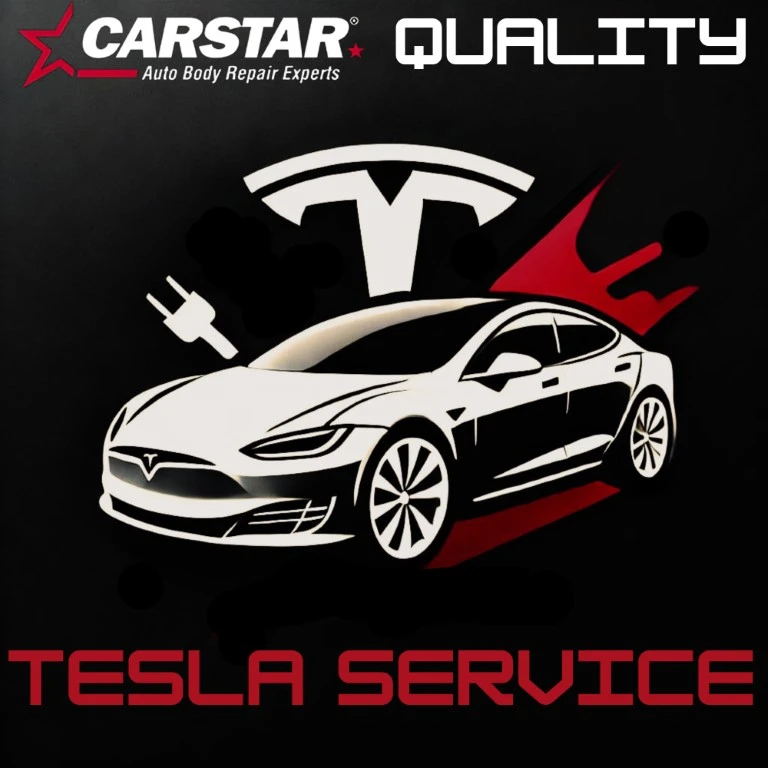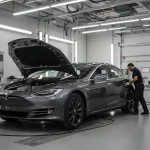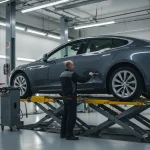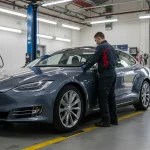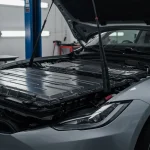Navigating the world of electric vehicle repairs, especially for a Tesla, can sometimes feel like a complex puzzle. But, imagine finding a place that simplifies this process for you, seamlessly integrating expert care with genuine parts and state-of-the-art diagnostic tools. Quality Tesla Service, located in Feasterville-Trevose, PA, and Carstar Quality Auto Body & Service emerge as your trusted partners in this journey. These centers not only boast certified experts and the latest equipment but also promise a hassle-free experience with their comprehensive services ranging from minor adjustments to major collision repairs. They stand out as premier destinations committed to maintaining your Tesla’s performance and warranty with genuine Tesla parts, ensuring your electric vehicle receives the finest care it deserves. Whether you’re pondering if a body shop can order Tesla parts, or you seek unmatched service quality, these establishments offer a clear answer and an open door to exceptional Tesla maintenance and repair services.
Overview of Tesla Repairs
Unique challenges with Tesla repairs
Repairing a Tesla presents unique challenges that differ significantly from traditional internal combustion engine vehicles. Due to their electric drivetrain, battery system, and cutting-edge technology, Tesla vehicles require specialized knowledge and equipment for repairs. The intricacies of dealing with high-voltage systems, proprietary technology, and unique structural materials like aluminum in many Tesla models necessitate expert handling to ensure safety and preserve the vehicle’s integrity.
The importance of using genuine Tesla parts
Using genuine Tesla parts for repairs is crucial for maintaining the performance, safety, and value of your Tesla. Genuine parts are designed specifically for Tesla vehicles, ensuring a perfect fit and optimal function. They also come with the assurance of quality and reliability, backed by Tesla’s warranty, to keep your vehicle running as designed.
Tesla’s position on third-party repairs
Tesla has maintained a cautious stance towards third-party repairs, primarily due to concerns over safety and quality. The company advocates for repairs to be done through its own service centers or Tesla-certified repair shops. This approach ensures the use of genuine parts and adherence to Tesla’s rigorous repair standards, protecting the vehicle’s functionality and the owner’s safety.
Tesla’s Parts Distribution Model
Tesla’s controlled distribution network
Tesla controls its parts distribution network tightly, allowing the company to maintain strict quality control and manage inventory efficiently. This approach limits the availability of parts to authorized service centers and certified repair shops, ensuring that Tesla vehicles are repaired according to the company’s high standards.
Direct sale model implications for body shops
The direct sale model of Tesla impacts body shops by limiting direct access to genuine Tesla parts. Only Tesla-certified shops have authorization to order parts directly, ensuring that these shops meet Tesla’s requirements for training and equipment.
Certified vs. non-certified repair shops
Tesla-certified repair shops have gone through a stringent certification process, proving they have the training, equipment, and facilities to perform repairs to Tesla’s standards. Non-certified shops, on the other hand, may not have direct access to genuine Tesla parts or the latest repair information, potentially affecting the quality of repairs.
Certification Process for Body Shops
Requirements for becoming a Tesla-certified repair shop
To become a Tesla-certified repair shop, a facility must meet specific requirements, including specialized training for technicians, investment in the necessary repair equipment, and adherence to Tesla’s strict repair standards. This ensures the shop is equipped to handle Tesla’s unique technologies and repair needs.
Training and equipment needed for certification
Certification requires comprehensive training on Tesla’s proprietary technology, repair techniques, and safety protocols. Body shops must also invest in specialized equipment designed for Tesla’s unique materials and structures, ensuring they can perform repairs to the manufacturer’s specifications.
Benefits of being a Tesla-certified body shop
Being a Tesla-certified body shop comes with several benefits, including access to genuine Tesla parts, up-to-date repair documentation, and direct support from Tesla. Certification also enhances the shop’s reputation, attracting customers seeking qualified technicians to repair their high-tech vehicles.
Ordering Tesla Parts as a Certified Shop
How certified shops order Tesla parts
Certified shops order Tesla parts directly through a dedicated portal, ensuring swift access to genuine components. This streamlined process helps maintain repair quality and speed, benefiting both the shop and the vehicle owner.
Limitations and conditions for ordering
Ordering parts is restricted to those shops that have completed the certification process, and certain parts might be limited based on the shop’s repair history and parts usage, ensuring that Tesla can monitor and manage the supply and distribution effectively.
Quality assurance and warranty on parts
Genuine Tesla parts ordered by certified shops come with quality assurance and a warranty, ensuring they meet the high standards expected for Tesla repairs. This provides peace of mind for both the repair shop and the vehicle owner.
Options for Non-Certified Body Shops
Challenges faced by non-certified shops in obtaining parts
Non-certified shops often face difficulties obtaining genuine Tesla parts due to Tesla’s controlled distribution model. This can lead to delays in repairs or the temptation to use non-genuine parts, potentially compromising repair quality and vehicle safety.
Possible routes to take for non-certified repairs
Non-certified shops may work through certified shops to obtain parts or advise customers to visit certified facilities for specific repairs. Some choose to specialize in aspects of Tesla repair that don’t require proprietary parts, such as certain cosmetic work.
The impact on repair quality and warranty
Repairs completed with non-genuine parts or by non-certified shops may not meet Tesla’s standards, affecting the quality and safety of the repair. Additionally, this could void the vehicle’s warranty, leaving the owner facing unexpected costs in the future.
Case Studies
Success stories of certified body shops
Certified body shops have reported high customer satisfaction scores and increased business due to their ability to provide specialized Tesla repairs. Their success underscores the value of certification and adherence to Tesla’s strict standards.
Challenges non-certified shops have faced
Non-certified shops often encounter challenges such as longer repair times due to parts accessibility issues and the inability to perform certain repairs, leading to customer frustration and lost business.
Comparative analysis of repair outcomes
Repairs performed by certified shops typically result in higher quality outcomes, alignment with safety standards, and preservation of the vehicle’s warranty. In contrast, repairs by non-certified shops may lead to issues with part fit, performance, and potentially voided warranties.
Tesla’s Policy on Aftermarket Parts
The use of non-Tesla parts in repairs
Tesla strongly advises against the use of non-Tesla parts in repairs, citing concerns over quality, safety, and performance. Non-genuine parts may not meet the rigorous standards set by Tesla, posing risks to the vehicle and its occupants.
Tesla’s stance on warranty when aftermarket parts are used
Using aftermarket parts in repairs can void Tesla’s warranty, leaving owners financially responsible for any resulting damage or malfunctions. Tesla maintains this policy to ensure the longevity and safety of its vehicles.
Safety and performance considerations
Tesla’s emphasis on using genuine parts revolves around safety and performance considerations. Genuine parts help maintain the vehicle’s engineered safety features, performance characteristics, and software compatibility, ensuring the Tesla driving experience remains intact.
Software and Tesla Repairs
Software updates in the repair process
Software updates play a crucial role in Tesla repairs, with many vehicle functions controlled by software. Certified shops have the ability to update and calibrate software during repairs, ensuring all systems operate correctly and harmonize with repaired components.
Calibration of Tesla-specific features post-repair
After repairs, it’s essential to calibrate Tesla-specific features, such as Autopilot and other driver-assist systems, to ensure they function correctly. Certified shops have the necessary tools and training to perform these calibrations accurately.
Access to Tesla software for certified and non-certified shops
Certified shops have access to Tesla’s repair software, updates, and diagnostics tools, enabling them to address software-related issues effectively. Non-certified shops lack this access, potentially limiting their repair capabilities for Tesla vehicles.
The Role of Insurance Companies
How insurance coverage affects repairs and parts
Insurance coverage can significantly influence the repair process, with some insurers preferring the use of aftermarket parts due to cost considerations. However, for Tesla vehicles, using genuine parts is paramount to maintaining the integrity and safety of the repair, a position often supported by certified repair shops during negotiations with insurers.
Negotiations between body shops and insurers for Tesla repairs
Certified body shops may engage in negotiations with insurance companies to advocate for the use of genuine Tesla parts and repair procedures, emphasizing the importance of maintaining vehicle safety and warranty coverage.
Certified vs. non-certified repairs: Insurance perspective
Insurance companies may have preferences regarding certified versus non-certified repairs based on cost considerations. However, for Tesla vehicles, insurers recognize the necessity of certified repairs to ensure the vehicle is restored to its original condition and safety standards.
Future of Tesla Repairs and Parts Accessibility
Evolving Tesla repair ecosystem
The Tesla repair ecosystem is evolving, with Tesla continuously updating its policies and support for certified body shops. This evolution aims to enhance the quality of repairs, parts accessibility, and overall customer satisfaction.
Potential changes to parts distribution model
Potential changes to the parts distribution model may include expanded access for non-certified shops under certain conditions or the introduction of alternative parts solutions that meet Tesla’s quality standards, broadening repair options for owners.
Impact of regulatory changes and consumer demand
Regulatory changes and increasing consumer demand for Tesla vehicles could drive further adjustments to the repair and parts distribution landscape. Efforts to promote right-to-repair laws and heightened consumer advocacy for accessible, high-quality repairs may influence Tesla’s approach in the future, ensuring that vehicle owners have reliable and convenient repair options.
By understanding the complexities of Tesla repairs and the importance of using genuine parts, both certified and non-certified body shops can navigate the challenges and opportunities within this unique ecosystem. As Tesla continues to innovate and expand its fleet, the repair industry will undoubtedly adapt, offering Tesla owners high-quality repair solutions that ensure the longevity, safety, and performance of their vehicles.
